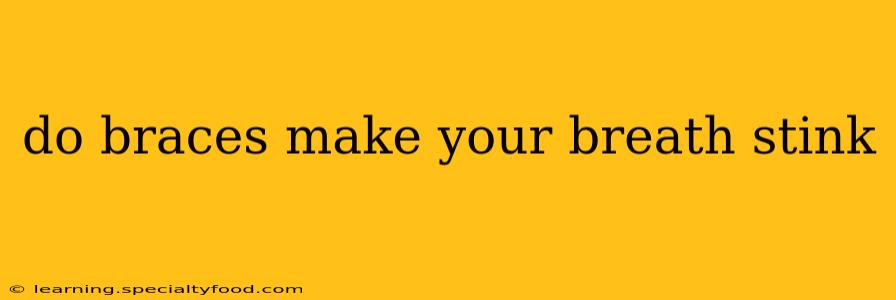Do Braces Make Your Breath Stink? A Comprehensive Guide
Yes, braces can contribute to bad breath, but it's not the braces themselves that cause the problem. The design and presence of braces create an environment that makes it easier for bacteria to thrive, leading to halitosis (bad breath). Let's delve into the reasons why and how to combat this common orthodontic side effect.
Why Do Braces Increase the Risk of Bad Breath?
The primary reason braces increase the risk of bad breath is their impact on oral hygiene. The brackets and wires of braces provide many nooks and crannies where food particles can easily get trapped. These trapped particles are then a breeding ground for bacteria, which produce volatile sulfur compounds (VSCs), the main culprits behind bad breath. This is especially true if your oral hygiene routine isn't meticulously followed.
What Foods Contribute to Bad Breath with Braces?
Certain foods are more likely to get stuck in and around your braces, leading to intensified bad breath. These include:
- Sticky foods: Candy, caramel, and gummy bears are notorious for clinging to braces.
- Foods with small pieces: Popcorn, nuts, and seeds can lodge themselves in hard-to-reach places.
- Sugary foods and drinks: These feed the bacteria that cause bad breath.
How Can I Prevent Bad Breath with Braces?
Maintaining excellent oral hygiene is crucial for preventing bad breath while wearing braces. Here's a comprehensive guide:
- Brushing: Brush your teeth thoroughly at least twice a day, ideally after every meal. Use a soft-bristled toothbrush and fluoride toothpaste, paying extra attention to the areas around your brackets and wires. Consider using an interdental brush to clean between your teeth and under the wires.
- Flossing: Flossing is even more important with braces. Use floss threaders to navigate the wires and clean between each tooth effectively.
- Mouthwash: An antibacterial mouthwash can help kill bacteria and freshen breath. Use as directed by your dentist or orthodontist.
- Regular Dental Checkups: Schedule regular checkups and cleanings with your dentist and orthodontist. Professional cleanings are essential for removing plaque and tartar buildup that's difficult to reach with home care alone.
- Dietary Considerations: Limit sugary and sticky foods, opting for healthier alternatives.
- Staying Hydrated: Drinking plenty of water helps wash away food particles and keeps your mouth moist.
Is Bad Breath a Sign of an Orthodontic Problem?
While bad breath is commonly associated with braces, it's usually a matter of oral hygiene. However, persistent bad breath could also indicate other issues, such as:
- Gum disease (gingivitis or periodontitis): Inflamed gums can contribute to bad breath.
- Dry mouth (xerostomia): Lack of saliva reduces the mouth's natural cleansing ability.
- Underlying medical conditions: In rare cases, bad breath could signal an underlying medical problem.
If you're experiencing persistent bad breath despite good oral hygiene, consult your dentist or orthodontist. They can determine the cause and recommend appropriate treatment.
How Long Does it Take for Breath to Return to Normal After Braces?
Once braces are removed, your breath should return to normal relatively quickly, provided you maintain excellent oral hygiene. However, it might take a few days or even a week for your mouth to fully adjust, and for any lingering food particles to be eliminated.
Can Braces Cause Dry Mouth?
While braces themselves don't directly cause dry mouth, the necessary oral hygiene practices (brushing and flossing) can sometimes lead to slightly drier mouth. Staying well-hydrated is vital to combat this.
By diligently following these tips, you can minimize the risk of bad breath and maintain a fresh, healthy smile throughout your orthodontic treatment. Remember that consistency is key – making oral hygiene a priority is the best way to prevent bad breath and keep your smile healthy.
